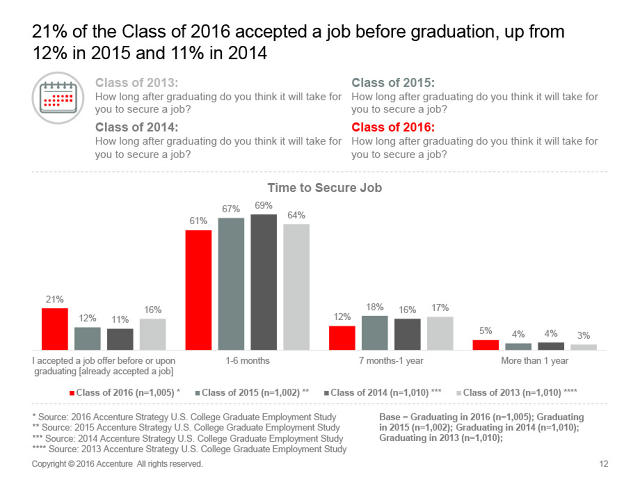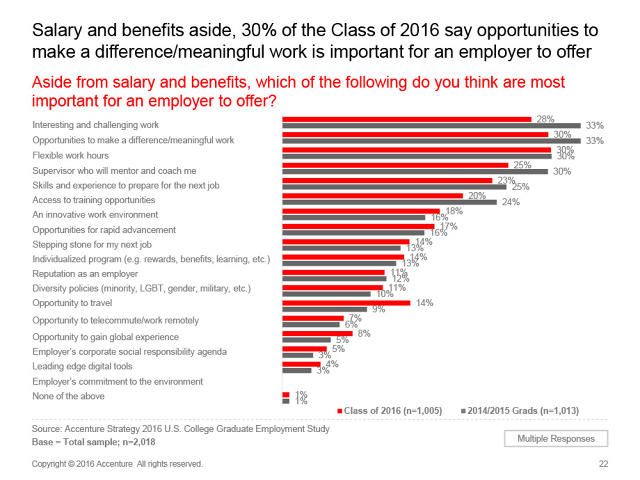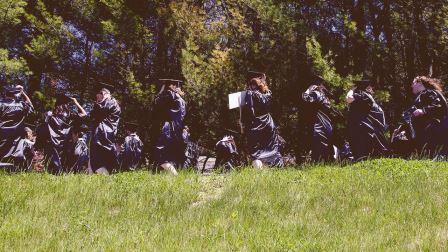The Class Of 2016 Is Both Practical And Idealistic About Their Job Prospects
By now you may have heard that the economic future of the Class of 2016 is looking relatively bright. The Economic Policy Institute (EPI) found that their job prospects are better than any other class since 2009.
For this cohort of newly minted careerists, optimism is running high despite the debt load many will carry along with their diplomas. Last year’s graduates emerged into the work world with an average of $35,051 in student loan debt—the highest in history, according to Edvisors.
Passionately Pragmatic
That’s perhaps why passion and practicality go hand in hand for this class, according to the fourth annual Accenture Strategy 2016 U.S. College Graduate Employment Study. “The class of 2016 is seeking a fulfilling employee experience in their first job,” David Smith, senior managing director, Accenture Strategy, said in a statement. “They are increasingly looking at workplace culture, and benefits other than salary, as important factors when making career decisions.”
Sixty-nine percent of the 1,005 students polled by Accenture in this year’s graduating class reported that they selected their major because they were passionate about that area of study. That’s 5% less than the 1,013 surveyed who graduated in 2014-2015. But 79% revealed that they considered the availability of jobs in their desired field of work before selecting their major.
Fully half of the students from the class of 2016 surveyed said they believed their area of study would provide them with a good long-term career and 42% reported they thought there would be a lot of job opportunities in their major. Less than a quarter (23%) of these students chose their major based on how much money they could make in that field, though.
Their pragmatic passion has paid off so far. Accenture found that 21% of the Class of 2016 accepted a job before graduation, up from 12% last year and 11% two years ago.

Culture And Career Advancement Over Cash
Given those findings, it’s not totally surprising that nearly three-quarters (70%) of the class of 2016 said they wanted to work in a positive environment, even if that meant a smaller paycheck. They aren’t as willing to forgo benefits, though. Fifty-five percent say they want to be employed full time (rather than as freelance or contract workers) to take advantage of health insurance or other benefits.
Nearly all (92%) of graduates said it’s important for their employer to demonstrate social responsibility. And a little less than a third (30%) believe that it’s also important for employers to offer meaningful work and create opportunities for them to make a difference.

This year’s graduates want to have fun, but they also want to keep learning. That’s why 80% said they expect their first employer to formally train them on the job and 77% expect that their experience will further their career. This may be why the students were three times more likely to report that they wanted to work for a small- or medium-sized business as opposed to the 14% who said they preferred getting a job a a big corporation. On-the-job training may be a stretch goal either way, as Accenture found that a little over half (54%) of 2014/2015 graduates reported actually receiving it.
Continuing their education also means going back to school. Thirty-seven percent of the graduates in this study believe advanced degrees will be necessary to further their career. This squares with recent findings from CareerBuilder which indicate that employers are bumping up education requirements for open positions that used to only necessitate an undergraduate degree.
Reality Bites
Of course, expectations don’t often match the realities of the workplace. The career optimism of 88% of these graduates who believe they’ll be snagging a job in their field of study is in sharp contrast to the number of 2014-2015 graduates who actually made this happen.
Underemployment is closer to their reality as 51% of 2014/2015 graduates reporting working in jobs that do not require their college degree, a steady increase of 10% since 2013.
As Fast Company reported previously, EPI’s researchers found that the number of underemployed graduates has been on the rise since 2007, and the jobs are of “lower quality” now.
Fifteen years ago, even though half of college grads were in jobs that didn’t require a degree, they could be found in career paths that paid well, such as dental hygienist or electrician. What’s more, their employers provided health benefits and pensions. Now graduates are more likely to take low-wage jobs, such as bartender, food server, or cashier, without the attendant benefits or compensation for overtime.
No wonder even their salary estimates don’t stack up with reality. The majority (82%) of 2016 graduates expect to earn more than $25,000 in their first job, yet 39% of 2014/2015 graduates reported making $25,000 or less.
That’s actually worse if you are a woman. According to the EPI, the gender wage gap among this year’s male and female college graduates is as high as $4.
Fast Company , Read Full Story
(25)













